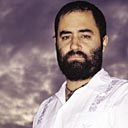
What does Murcof's music sound like? Not "world", and definitely not "jazz", so I guess that puts Fernando Corona, the Mexican musician behind Murcof, firmly in the "etc" camp. His signature sound is a distinctive string sample, a yearning, keening sound, only half-formed, within an edgy urban soundscape, all long echoes and scratchy glitches. Murcof's 2002 debut album, Martes, is one of the biggest-selling releases on the Leaf label, which celebrates its 10th anniversary this month with various live events and a brand new Murcof release: Remembranza.
Listen to it and you're immersed in a world of tiny intricate noises, chattering laptop rhythms, pulses and clicks that feel as if they were millimetres from your face, and deep reverberations that seem to come from a distant underwater cathedral. Yet there are plenty of people out there creating squeaky, bubbling, reverberant music from samplers and laptops. What's extraordinary about Corona's Murcof project is that it has cut through the narrow confines and splintered genres of dance, electronica and experimental creative music to find a bigger audience.
Corona, born in 1970 in Tijuana, grew up in the Mexican port of Ensenada. He had some formal training from his musician father, studying piano and cello, but is mainly self-taught. Early influences included Jean-Michel Jarre's Oxygène, Tomita and British synth-pop of the 1980s. In his teens he bought a cheap synthesizer and formed an electronic band called Vortex. After a stint in an acoustic rock band, he began to compose electronic music for dance and multimedia ventures, creating the electronic dance project Terrestre, and eventually hooking up with the Nortec collective of DJs and graphic artists.
Both Corona's projects - Terrestre and Murcof - are essentially one-man bands, but they are excuses to do different things. "They cover different necessities I have as a musician," he explains. "Both projects are very personal, but Murcof tends to be more introspective and refined, and Terrestre more extrovert and raw."
Corona makes his music on a PC he built himself. "I have favourite programs, but I'm always trying new stuff to look for new ways of working. I use brand software but also a lot of freeware and dodgy plug-ins. Some of them end up making very interesting textures; they have this randomness that I find appealing."
The samples are mainly custom sounds he creates. "I've recorded myself playing as well, the piano and the cello. I can hardly play them, but it's OK, since my main interests are the textures and vibe."
It took two years to complete Remembranza, and the album became a requiem for his mother, who died during its making. There have been other changes in his personal life. Needing a break from "Tijuana and the whole border culture thing", Corona relocated with his family to Barcelona.
On tracks such as Rostro, Corona introduces some of the qualities of timelessness and physical space that we associate with classical music. Many of these emerge naturally when you record musicians playing good instruments in a decent-sounding hall or church. Yet Corona achieves this without counterfeiting acoustic ensemble sound - the overall sound remains predominantly electronic. The result is something new: music that seems both organic and synthetic.
A track such as Reflejo heads off in a different direction, with its insistent four-on-the-floor kick sample, drones, swirling, slow melodic lines and the occasional tinkle of a high piano. A cello line dominates, as does an occasional timpani hit, while the long, string lines unravel over a deliberately monotonous pulse that holds everything together. When heard in the right frame of mind, this is mesmerising.
A short interlude such as Retrato may hold the key to Murcof's appeal: a backwards piano, clicks, static and other "sound design" techniques induce an unhurried sense of sonic space. Though this is ostensibly "difficult" listening, the sounds are easy on the ear; even the most abrasive elements are almost catchy. Despite the digital distractions, a track like Rios has a simple, attractive sequence and melody. And the final track, Camino, has a melodic arc and dub-like rhythm that will worm its way into your brain as insistently as the dumbest pop hook.
Next week, Corona will perform as Murcof at London's Spitz opposite Sutekh and the brilliant Danish outfit Efterklang as part of the "Leaf is 10" celebrations. Though Murcof's live gigs are precise, controlled from a single laptop, Corona's recording methods are totally the opposite: "My way of working is a mix of composing, experimenting and improvising; the sounds themselves guide me through the composition process. By experimenting I can come up with interesting sounds that trigger a melody in my head, so I go ahead and lay it down, but it turns out it didn't quite work, so I improvise a bit and - voila! - it turns out to be what I was really looking for."
· Murcof is at the Spitz, London E1 (020-7392 9032), on Wednesday. Remembranza is out now on Leaf.

